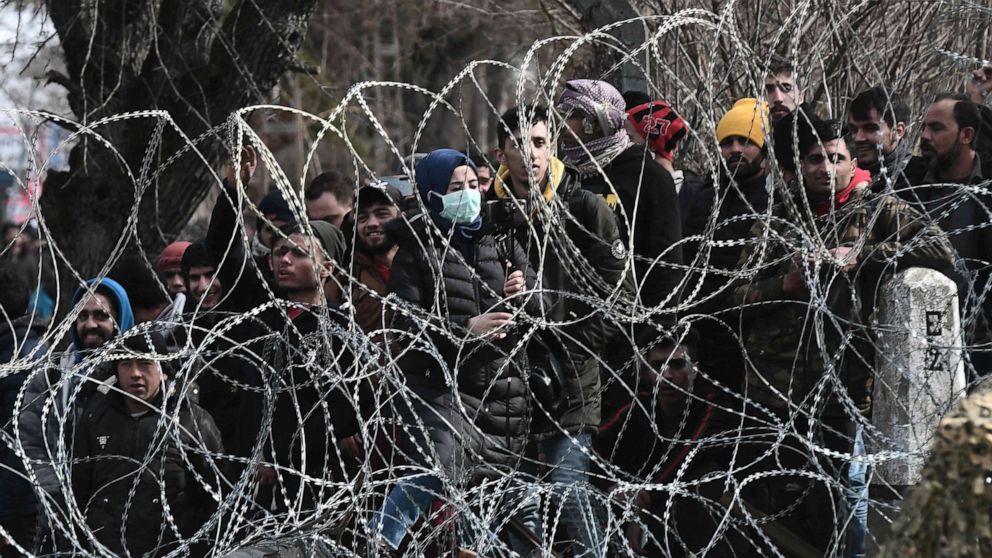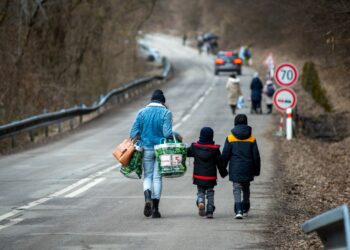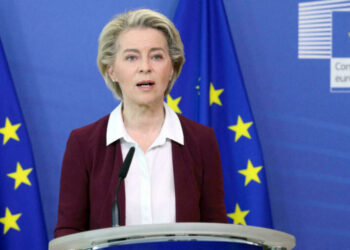Fatmata and Abu Bakar were trying to reach safety. They’d been on the move for months – from Sierra Leone to Greece, where they had hoped to obtain asylum. Instead, told to leave Greece but with no legal or financial means to travel, the couple decided to make their way along the precarious Balkan route.
They were entering North Macedonia on April 19, near the town of Gevgelija, when a police officer shot and killed Fatmata.
She didn’t die right away. She called out for Abu Bakar, who carried her into a police car, hoping for assistance. By the time officers reached the nearest hospital, Fatmata was no longer breathing.
“They didn’t put her on a bed,” Abu Bakar told me on a video call, “but they just carried her in by her arms and her legs.” Rather than being allowed to stay with her, Abu Bakar was taken to a detention center.
No Exception
It’s tempting to begin with the numbers when writing about border violence. They’re grim: UNHCR’s data portal shows that nearly 1,100 people have gone missing in the Mediterranean Sea since January of this year. Yet these numbers – and the more than 26,850 people who have drowned or gone missing in Mediterranean crossings over the last decade – have yet to motivate more compassionate policies or humane practices.
While Fatmata’s killing was sudden and brutal, it’s important to recognize what happened to Abu Bakar and Fatmata not as exceptional but as routine. Shootings are not an everyday occurrence, but they do happen.
Moreover, they fit within a broader pattern of policing borders at the cost of human lives. Similar to the case of Central American migration to the US, people trying to reach Europe by sea and through the Balkans have fled violence, extreme precarity, political persecution, and the consequences of climate change. They travel along dangerous routes because safe, legal pathways have been closed to them.
Increasingly, they encounter EU borders beyond the geographical limits of the EU – as in the case of North Macedonia, a candidate for EU membership that has played a marked role in policing EU borders since 2015.
While the officer who shot Fatmata was with the North Macedonian police, that same week also marked the start of a joint operation between North Macedonia and EU border agency Frontex, which is deploying more than 100 members of its new armed standing corps there.
Fatmata’s murder is also a reminder that securitized borders are related to the expansion of militarized policing more broadly.
Fatmata, 23, was fairly certain she was pregnant and had recently shared this news with Abu Bakar. Authorities have kept the autopsy that could confirm this news confidential – not even Abu Bakar has seen it. So the question of whether Fatmata was killed carrying their child remains one of many unknown facts.
Her mother and sisters in Sierra Leone wait anxiously; they have no body to bury. “It’s been over a month and she’s not been put to rest,” Fatmata’s older sister, also named Fatmata, told me. “We can’t see her and say our last words to her.”

Securitization and Militarization of Borders
This violence, and the expanding web of people whose lives it transforms, is the inevitable consequence of the securitization and militarization of borders and of the EU’s efforts to externalize its borders, policing on behalf of Europe in countries outside the EU – in Senegal and in Libya, like in North Macedonia.
The EU Commission and Frontex claim that restrictive entry policies and border policing agreements with third countries like North Macedonia operate in the name of human rights, but these policies and practices continue to put migrants in danger.
The police officer’s shooting of a person attempting to reach safety, and her death in a police car en route to a hospital – where, Abu Bakar said, she was treated “like an animal” – underscores how border externalization prioritizes the rights of some people while legitimizing violence against Europe’s unwanted others.
“Did they shoot her because of her race?” Fatmata’s sister wondered. “Because she was a woman? Is it because she crossed the border? Were there no other ways to have her leave the country? She was unarmed. She had the right to live.”
Violence in Europe’s Border Zones
Death in Europe’s border zones has repeatedly made international news this year, including when a migrant boat moving from Turkey and knowingly ignored by Frontex wrecked near Crotone, Italy, on February 26, killing at least 70 people.
Tunisian authorities are planning new cemeteries to keep up with the number of drownings at their shores by people trying to leave. It’s difficult for the families of shipwreck victims to have confirmation of their loved one’s death, rare for the body to be returned home for burial.
This violence – both the deaths themselves and the lack of sanctioned care for the deceased and their loved ones – has become so normalized among Western audiences that it sees only brief, if any, media coverage.
It accompanies a host of other practices that put lives at risk, including, for instance, the abandonment of migrants at Polish borders, and pushbacks like the one coordinated by Malta last week, when authorities allowed the Libyan coast guard to tow a boat carrying 500 people back to Benghazi, where it imprisoned the passengers.
I reached Abu Bakar and Fatmata’s sister through staff with Greece-based NGO Second Tree (a group I collaborate with), which is supporting Abu Bakar as he navigates legal and institutional hurdles. Second Tree staff’s presence is also a way of offering Abu Bakar community in a moment when authorities might otherwise have simply abandoned him, or – as they initially attempted – driven him to the border with Serbia and told him to leave.
As a scholar of migration, asylum, representation, and rights, I wrestle with what to do with accounts like Abu Bakar’s and Fatmata’s: how to convey the weight of this dehumanizing violence without sensationalizing suffering? Without turning people’s lives into abstract counts?
One answer is to recognize Fatmata’s murder both within the dimensions of trauma and personal grief, and also as a consequence of the structural violence cemented by Europe’s border regime.
Another answer comes from Abu Bakar himself. While he awaits word on his asylum claim, and on the outcome of criminal investigations into the shooting, one of the greatest risks, he says, is that people stop paying attention.
“Everyone should know what happened here.”
Disclaimer: The views and opinions expressed here are those of the author and do not necessarily reflect the editorial position of The Globe Post.






















